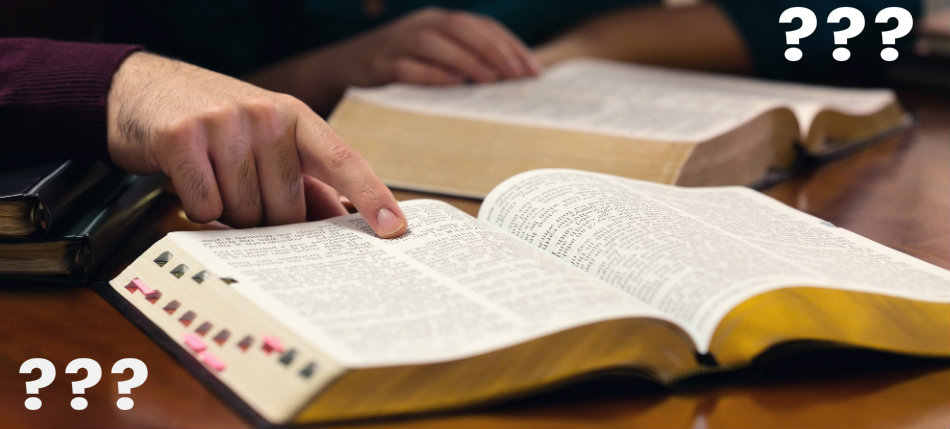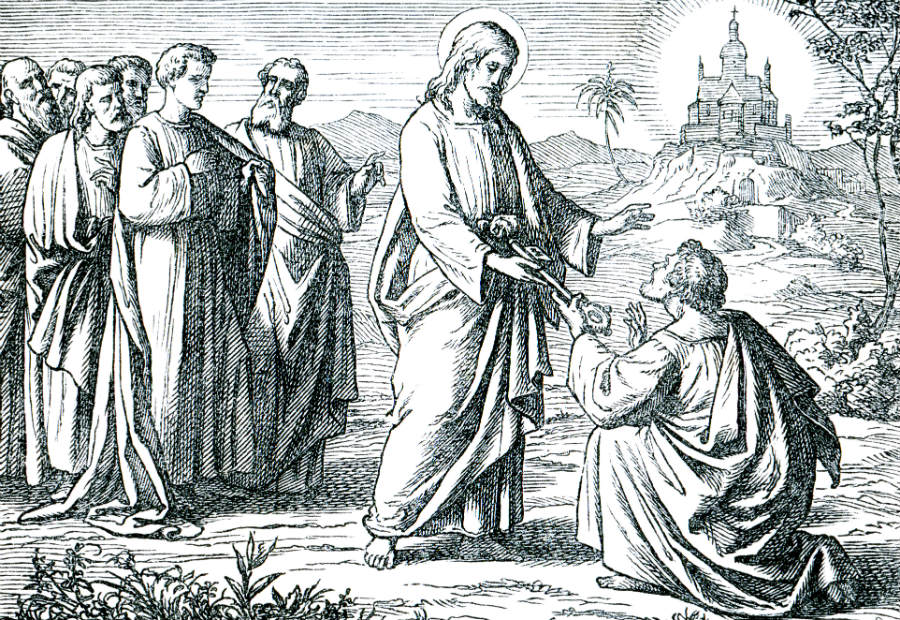Be sure to also read: CLYDE URGED ME TO READ 2 TIMOTHY 3:16 & STOP GROPING IN THE DARK
Let me set the stage for this post before getting more deeply into "Where is that in the Bible?"
Whether you are Catholic, Protestant or have other beliefs, you will most likely form an initial opinion based on your current beliefs. I ask that you keep an open mind and see both sides of this: Catholic View vs. Protestant View.
As far back as I can remember into my childhood until the age of 50, my time was spent in a Pentecostal or Baptist church with some attendance in the Church of Christ ( wife brought up in ) and like many Protestants, I have had periods of stay at home Christianity.
In my opinion, stay at home Christianity is one of the problems with the "Alone" or "Sola Doctrine" that Martin Luther came up with and how it has developed over 500 years: Just me and Jesus at home with my Bible because I have faith ( Sola Scriptura “Scripture alone” | Sola Fide “faith alone” | Solus Christus “Christ alone” ) when I'm perfectly capable of attending church and doing way more for God. FYI, we are clearly commanded "to do" and "to not do" and it's hard to do much on the couch ( if able to do more ).
____________________________________________________________________________________________________________________
I never attended a regular Catholic Mass until I was 50 years old. The only times that I had ever been in a Catholic church were two Catholic weddings that come to mind that I barely remember from when I was in my 20's.
I never gave Catholicism much thought either way until mid-to-late 2016 and have NEVER been anti-Catholic. For example, some anti-Catholics say that Catholics are not Christians or that the Catholic Church is the "Whore of Babylon" mentioned in the Bible.
I have approached Catholicism with an open mind and eager to understand the Church teachings. No one has shoved Catholicism down my throat. As of this post, I have yet to meet a pushy Catholic or hear a pushy Catholic on Catholic radio.
One of my discoveries has been that Protestants seem to like asking "Where is that in the Bible?" which is often directed towards Catholics as a way to prove what Catholics believe and practice is wrong.
Wouldn't it be nice if we could just all hold hands and be happy together as Catholics and Protestants? That will definitely take a moving of the Holy Spirit.

Is the Bible clear that we should all be one?
I Corinthians 1:10 "I appeal to you, brethren, by the name of our Lord Jesus Christ, that all of you agree and that there be no dissensions among you, but that you be united in the same mind and the same judgment."
I Peter 3:8 "Finally, all of you, have unity of spirit, sympathy, love of the brethren, a tender heart and a humble mind."
Ephesians 4:1-3 "I therefore, a prisoner for the Lord, beg you to lead a life worthy of the calling to which you have been called, with all lowliness and meekness, with patience, forbearing one another in love, eager to maintain the unity of the Spirit in the bond of peace."
Many Protestant Christians read the Bible, can quote scriptures by book, chapter and verse, enjoy Bible study, pray often and love Jesus. Contrary to what some believe, many Catholics read the Bible, actually know more scripture than many protestants ( even if they cannot quote book, chapter and verse ), have Bible studies, pray often and love the same Jesus that Protestant Christians love.
Where in the Bible does it clearly, unequivocally, without a shadow of a doubt, state that everything has to be in the Bible?
There are numerous protestant beliefs, practices, traditions, etc. that are either not in the Bible at all or are not clear in the Bible as many of the thousands of Protestant churches believe and practice.
Many Protestants will not hesitate to go after Catholics about The Pope, Purgatory, The Crucifix, Making The Sign of The Cross, Holy Water, The Immaculate Conception, The Assumption of Mary and more. Why? Because most Protestants do NOT believe those things are clearly in the Bible . Many Protestants actually believe that Catholics worship Mary and statues ( wrong ) and have many other misconceptions about Catholics.
2 Timothy 2:15 "Do your best to present yourself to God as one approved, a workman who has no need to be ashamed, rightly handling the word of truth."
In the 7 Habits of Highly Effective People by Dr. Stephen Covey in habit 5: "Seek First to Understand, Then to be Understood." We all form opinions based on our beliefs which can often be driven by our own private interpretation of scripture. Although I have never been anti-Catholic and have always seen Catholics as fellow Christians, I previously never took the time until to truly understand Catholicism.

Is it possible that there is a place for oral tradition ( Sacred Tradition as taught by the Catholic Church )?
2 Thessalonians 2:15 "So then, brethren, stand firm and hold to the traditions which you were taught by us, either by word of mouth or by letter."
Did oral tradition ( Sacred Tradition ) stop with the death of the Apostle's? I don't think so.
Yes, I know the argument, "If it's contrary to the word of God and cannot be pressed up against the scripture, then it's wrong, wrong, wrong." Remember, my background is Pentecostal and Baptist with a some Church of Christ sprinkled in.
I understand the argument and validity of "contrary to scripture" which is why I like to understand the Biblical foundation or Biblical principle behind many teachings and practices.
Have you ever considered the words "Trinity" and "Incarnation" that are not in the Bible, yet widely accepted by Christians worldwide, may have been passed down orally over the ages? If they are not in the Bible, how did they start and why do so many Christians use these and other words that are not in the Bible? Why have a problem with the words Pope and Purgatory that are not in the Bible but not have an issue with Trinity and Incarnation. Could it be a double standard?
Did you know that Jehovah's Witnesses do not believe in the Trinity? Should the rest of us reject the Trinity doctrine as well since the word Trinity is NOT IN THE BIBLE but the Biblical principle exists? I don't think so.
FYI, I believe in the "Trinity" and "Incarnation" even though the words are not in the Bible because I see the Biblical foundation or Biblical principle. I also see the Biblical principles for "Pope" and "Purgatory."
There are many more examples like these that many do not think twice about, but as soon as the Pope is mentioned to non-Catholics, many people freak out.

Let's take a look below to see if there is an foundation to what Cardinal John Henry Newman ( Converted to Catholicism in 1845 ) once said, "To be deep in history is to cease to be Protestant."
Is it possible that Jesus taught more than we have in the Bible and that those things were passed down through the ages that still align with scripture?
John 21:25 "But there are also many other things which Jesus did; were every one of them to be written, I suppose that the world itself could not contain the books that would be written."
I believe that it's not only very possible, but 100% likely, that Jesus said things that Saint John The Apostle heard that were never written down. Then, St. John shared some of those things with Polycarp ( a disciple of St. John, also the Bishop of Smyrna and an early Church Father ). Then, Irenaeus ( Bishop of Lugdunum, who wrote a book "Against Heresies" and is also an early Church Father ) who heard Polycarp preach likely continued to share what he learned orally. This is just one example.
Acts 2:42 "And they devoted themselves to the apostles’ teaching and fellowship, to the breaking of bread and the prayers." The Apostles' heard it straight from Jesus. They were not carrying around a leather bound "Holy Bible" with the Old and New Testament in it. Do you think it's possible they taught things that are not clearly in the Bible but could be part of Sacred Tradition?
The common man ( for hundreds of years ) was often illiterate and the Bible ( hand copied until the 1400's when the printing press was invented ). Times were different than the modern age we live in. For hundreds of years, people were "taught orally" and "scripture was read to them."
For well over 1,000 years after the death of Christ, Bibles were so expensive that they were chained to keep them from being stolen. The Bible was copied by hand until the printing press was invented in the 1400's. It doesn't take very much open minded, cross referencing, online research over just an hour or two to find out. You may also want to get this book off Amazon.
It's interesting to me that many Protestant based websites often glaze over early church history, the Church Fathers and how the Bible came about: It's like once the Apostle's died, the Church went into apostasy and deep into the dark ages until 1517 when this amazing man of God, Martin Luther ( a Catholic Priest by the way ), came along and brought the church back to life.
It's interesting that Luther, Calvin and Zwingli couldn't agree on everything in the 1500's. Thus, the reformation has lead to the creation of thousands of Protestant denominations and non-denomincations over the last 500 years most of which think they are following the Bible as it is supposed to be followed. But Protestant denominations and non-denominations cannot agree on many points. Furthermore, the continued disagreement keeps the splintering going on and on.
Ephesians 4:4-6 "There is one body and one Spirit, just as you were called to the one hope that belongs to your call, one Lord, one faith, one baptism, one God and Father of us all, who is above all and through all and in all.
CATECHISM OF THE CATHOLIC CHURCH SECOND EDITION ( See The Catechism Online ):
77 "In order that the full and living Gospel might always be preserved in the Church the apostles left bishops as their successors. They gave them their own position of teaching authority." Indeed, "the apostolic preaching, which is expressed in a special way in the inspired books, was to be preserved in a continuous line of succession until the end of time." 78 This living transmission, accomplished in the Holy Spirit, is called Tradition, since it is distinct from Sacred Scripture, though closely connected to it. Through Tradition, "the Church, in her doctrine, life and worship, perpetuates and transmits to every generation all that she herself is, all that she believes." "The sayings of the holy Fathers are a witness to the life-giving presence of this Tradition, showing how its riches are poured out in the practice and life of the Church, in her belief and her prayer."
There are some Protestant things on my list below that may go against the Catholic Church interpretation that I have come to believe that the Catholic Church interpretation has more biblical support. Therefore, I take a Catholic position on those like "The Eucharist" ( Lord's Supper ).
There are things like Christmas and Easter that overlap for both Catholics and Protestants that are enjoyed by both Catholics and Protestants. However, the celebrations are not in the Bible nor are the words. Did you know that Jehovah's Witnesses don't celebrate Christmas or Easter because they believe both have pagan roots and that there is lack of support from the Bible?
Is it not a double standard when some Protestants challenge Catholics on things that Catholics do like dipping their finger in holy water and making the sign of the cross when entering the Church? It didn't take much to find this online, "The Bible nowhere instructs Christians to use "holy water" in any way, shape, or form. The Catholic use of holy water is not biblical."
I am "NOT" saying all the Protestant traditions listed are wrong and that they should not be adhered to because they are either "NOT" listed in or not 100% clear in the Bible. You'll find a list of things below that most Protestants do not have an issue with and you'll be hard pressed to find most of them clearly in the Bible.
...Sunday School / Children's Church ( Separating Adults/Children ) / Summer Bible Camp
...Wednesday Night ( Mid-Week ), Coffee Shop Group or Men's Group Bible Studies
...Praise & Worship Band / Hollywood Style Entertainment - Because It Feels Good
...The Words: Rapture, Trinity, Lord's Supper, Incarnation, Lord's Prayer & Many More ... It interesting that one anti-Catholic writes: "It is illogical to claim that since the word "Trinity" is not found in the Bible, that its concept is not taught therein." Yet, his writings about Catholicism are irritating: "If a Roman Catholic believes in the official Roman Catholic teaching on salvation, then he is not a Christian since the official RCC position is contrary to Scripture." Trust me, I've spent hundreds of hours on Catholicism. This guy is using his OWN PRIVATE interpretation to come to the second conclusion.
...When Praying: Holding Hands, Bowing Head, Closing Eyes, Hands Clasped Together Under Chin
...The Altar Call , The Sinner's Prayer and Accepting Jesus As "Personal" Lord And Savior
...The Lord's Super ( Communion ) as Symbolic ( Once A Quarter )
...Christmas & Christmas Drama | Easter & Sunrise Service ( I'm all for it, but it's not in the Bible. )
...Sharing Personal Testimony in Church ( very popular when in the 70's at the church I attended )
...Cross on the church steeple and/or a cross inside the church ( Yet, having a problem with the Crucifix ) It's true Jesus is not hanging ( key argument ) on the cross, but Jesus is also no longer a baby as depicted in manger scenes. The Crucifix reminds me what he sacrificed for me. I know he conquered death, hell and the grave.
...Infant Dedications ( Yet, rejecting Infant Baptism )
...Water Baptism as Symbolic ( Church of Christ, Catholic Church & Others don't see it that way. )
...But As Long As We Agree On The Essentials - What are the essentials? Is it Christ on the Cross? What about "once saved always saved" vs. "salvation can be lost?"
Closing questions to consider beyond what I have written above:
1)Did the Bible come with a God inspired list of what books belong in it? I'm not referring to the list at the beginning of the Bible that was added by man. I'm referring to the Bible itself telling us what books are supposed to be in there? Where does the Bible say that everything has to be in the Bible?
2) Where in the Bible does it provide instructions for Holy Matrimony? Have you ever thought about that? Think of how we all view a valid marriage. Can you find those detailed instructions laid out in the Bible?
These final questions along with everything else that I have covered in this post is worthy of thinking and praying about. The "Fundamentalist" - "Literalist" approach is often so closed minded that there is no room for logic and prayer to discover the real truth. FYI, I was once a "Fundamentalist," so that gives me a little more right to speak from experience.
Protestants need to think twice before challenging Catholics with "Where is that in the Bible?"
Check out my post: THE CHURCH – VISIBLE NOT INVISIBLE: ONE, HOLY, CATHOLIC AND APOSTOLIC
____________________________________________________________________________________________________________________
Although the first video below on the left is 54 minutes, the one on the right is less than 3 minutes and the other 8 videos are 10 minutes or less.



